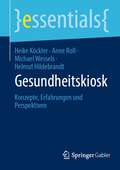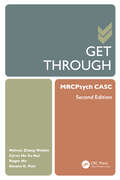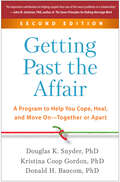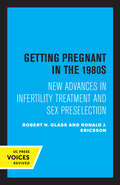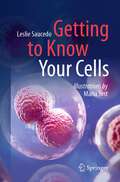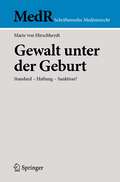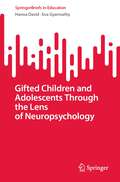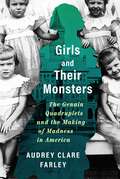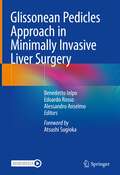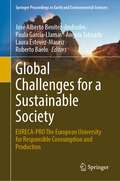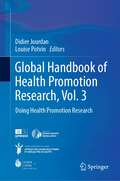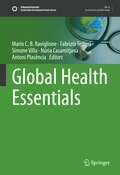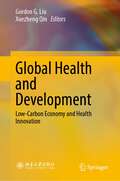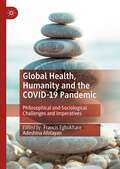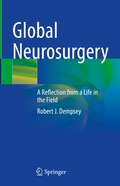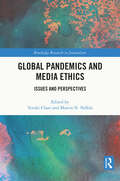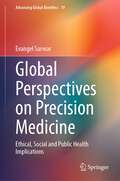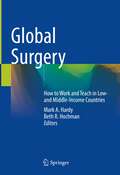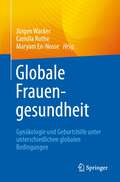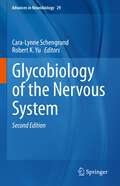- Table View
- List View
Gesellschaften in der Krise: Praktiken, Diskurse und Wissensregime in Zeiten von Corona
by Helene Gerhards Debora Frommeld Karsten WeberDas Virus SARS-CoV-2 und die dadurch ausgelöste Coronapandemie haben die Gesellschaft in einen Krisenmodus versetzt: Die Coronapandemie hat tiefgreifenden Einfluss auf den Alltag von Subjekten in allen Lebenslagen genommen, gesellschaftliche Bedingungen verändert und institutionelle Veränderungen angestoßen. Ob das Tragen eines Mund-Nasen-Schutzes, die virtuelle Kommunikation als neuer Standard in Arbeitsumgebungen oder Regelungen zu Impfungen und öffentlichem Gesundheitsschutz – gesellschaftliche Praktiken und Diskurse haben sich verändert sowie Wissensregime etabliert, die einer genaueren multidisziplinären Analyse würdig sind. Der Band versammelt Beiträge zu Bereichen, die von einem krisenbedingten Wandel betroffen sind: Alter, Bildung, Emotion, Freiheit, Geschlecht, Gesundheit, Digitalisierung, Körper, Medizin und Versorgung sowie Sorgebeziehungen.
Gesundheit als Wandlungsfähigkeit: Viktor von Weizsäckers Beitrag zu einer kritischen Medizintheorie
by Hans-Martin RiegerJedes Verständnis von Gesundheit und Krankheit ist von Hintergrundvorstellungen abhängig, die medizintheoretisch und anthropologisch bedacht zu werden verdienen. Für die Medizin empfiehlt sich eine kritische Medizintheorie und ein anthropologisches Konzept auch um ihrer wissenschaftlichen Selbstständigkeit willen. Dieses grundlegende Anliegen kennzeichnet die Arbeit des Neurologen und späteren Ordinarius für allgemeine klinische Medizin Viktor von Weizsäcker(1886-1957) und ist von bleibender Aktualität. Die Untersuchung bietet eine Einführung in Weizsäckers Gesundheitsverständnis vor dem Hintergrund gegenwärtiger Diskussionen. Von da aus schreitet sie weiter zur Reflexion der wissenschaftlichen Grundlagen von Biologie und Humanwissenschaften und hinterfragt die Übernahme naturwissenschaftlicher Kategorien auf das Leben im Allgemeinen und auf den Menschen im Besonderen. Das Programm einer „Einführung des Subjekts“ erfordert eine Revision des biologischen und medizinischen Denkens. Zentral wird die Grundstruktur des Verhältnisses eines Organismus bzw. eines leiblichen Subjekts zu seiner bedeutungsvermittelten Umwelt. Innerhalb dieser Struktur kommt Gesundheit als lebensgeschichtliche Kohärenz oder Responsivität zu stehen. Ermöglicht wird diese durch eine psychophysische Wandlungsfähigkeit des Organismus. Weizsäckers Forschungsimpuls für gegenwärtige Problemstellungen und Modellbildungen ist als beachtlich zu bewerten – und zwar gerade dann, wenn man die von ihm gefundenen oder behaupteten Grundstrukturen wissenschaftsgeschichtlich erschließt. Viele dieser Grundstrukturen sind nicht nur für eine heutige Grundlegung der Psychosomatik und für den Umgang mit den Neurowissenschaften, sondern auch fürVersuche einer integrativen Medizin wegweisend.
Gesundheit – Teilhabechancen – Diskriminierungsrisiken: Health in All Policies als Querschnittsaufgabe bei Beeinträchtigungen und Behinderung (Gesundheitsförderung - Rehabilitation - Teilhabe)
by Martina Brandt Elisabeth Wacker Swantje Köbsell Iris Beck Sonia Lippke Mathilde NiehausDies ist ein Open-Access-Buch.Das Recht auf Gesundheit und Wohlergehen steht allen Menschen zu, unabhängig von Alter, Geschlecht, Beeinträchtigung oder anderen Vielfaltsmerkmalen. Auf die enge Verknüpfung von gesellschaftlicher Teilhabe und bestmöglicher Gesundheit macht das Gemeinschaftswerk aufmerksam. Es weist auf Exklusions- und Isolationsrisiken hin, zeigt Erfahrungen aus der Coronapandemie auf und öffnet Wege, um Benachteiligungen abzubauen, auch für den demografischen Wandel. Vielfache wissenschaftliche Expertise (aus dem Wissenschaftlichen Beirat der Bundesregierung zur Teilhabeberichterstattung) und zukunftsweisende fachliche Debatten werden unterlegt mit neuesten Daten und dem Blick auf die globalen Gesundheitsziele.
Gesundheitsförderung und Präventionsarbeit im Pflegeheim: Praktische Umsetzung für Führungskräfte
by Laura Luise Bischoff Ann-Kathrin Otto Bettina WollesenDieses Buch vermittelt Führungskräften und Verantwortlichen im Pflegebereich durch Handlungsempfehlungen und Best-Practice Beispiele ein umfassendes Verständnis dafür, wie eine Pflegeeinrichtung eine „gesundheitsfördernde Organisation“ wird. Es werden Maßnahmen zur Gesundheitsförderung für das gesamte Setting vorgestellt und diskutiert. Best-Practice Hinweise aus den Erfahrungen mehrerer Forschungs- und Modellprojekte der letzten fünf Jahre zeigen, welche Maßnahmen erfolgreich sind und welche positiven Auswirkungen sie auf die Beteiligten haben.
Gesundheitskiosk: Konzepte, Erfahrungen und Perspektiven (essentials)
by Michael Wessels Helmut Hildebrandt Heike Köckler Anne RollDieses Buch beschreibt den aktuell diskutierten und vereinzelt erprobten Ansatz der Gesundheitskioske. Gesundheitskioske stellen ein innovatives Angebot im Gesundheitsbereich dar, da sie den Zugang zu Versorgung, Prävention und Gesundheitsförderung insbesondere für solche Communities erhöhen, die sich mit Zugangsbarrieren konfrontiert sehen. Zugangsbarrieren können in der Kenntnis des Gesundheitssystems, Sprachkompetenz, den fehlenden gesundheitsbezogenen Angebote in der unmittelbaren Wohnumgebung liegen. In diesem Essential wird die Vielfalt der aktuellen Ansätze aus einer gesundheitsökonomischen, sozialräumlichen und pflegerischen Perspektive vor dem Hintergrund eigener Erfahrung im Aufbau und der Implementierung von Kiosken beschrieben. Denn zur Umsetzung eines Gesundheitskiosks ist immer eine spezifische Lösung am jeweiligen Ort zu entwickeln.
Gesundheitskompetenz (Springer Reference Pflege – Therapie – Gesundheit)
by Orkan Okan Katharina Rathmann Kevin Dadaczynski Melanie MesserDieses Referenzwerk bietet einen umfangreichen Überblick zu den zentralen Themen der Gesundheitskompetenz und richtet sich an Studierende, Dozierende, Wissenschaftlerinnen und Wissenschaftler unterschiedlicher Disziplinen im Gesundheitsbereich sowie an Expertinnen und Experten aus der Praxis.Was ist Gesundheitskompetenz und wie wird sie gemessen? Die Autorinnen und Autoren zeigen neben den konzeptionellen Grundlagen gängige Methoden und Instrumente zur Erfassung der Gesundheitskompetenz bei verschiedenen Altersgruppen und gesundheitlichen Themenfeldern auf. Dabei wird der Blick auf betriebliche und nicht-betriebliche Lebenswelten sowie die Digitalisierung gerichtet. Neben der aktuellen Studienlage und aktuellen Projekten werden Herausforderungen der Zukunft aufgezeigt.
Get Through MRCPsych CASC (Get Through)
by Roger Ho Basant K. Puri Melvyn Zhang Weibin Cyrus Ho Su HuiGet Through MRCPsych CASC, Second Edition is intended for psychiatric trainees sitting the CASC component of the MRCPsych exam. Written by authors with recent exam experience and long-term expertise in the field, the text provides over 100 stations closely matched to the subjects that appear in the actual exam, along with informative diagrams, concise synopses, and guidelines for how to target your revision to enable recall of the most relevant information. *Gives a detailed appraisal of how to approach over 100 stations for the CASC component of the examination *Shares the guidance of experts in Psychiatry and Medical Education *Builds on a successful first edition with tips on pitfalls
Getting Past the Affair: A Program to Help You Cope, Heal, and Move On--Together or Apart
by Douglas K. Snyder Donald H. Baucom Kristina Coop Gordon"How could my partner have done this?" "What was my role?" "Can this relationship be saved?" Discovering that your partner has had an affair can feel like an earthquake. Long after the first jolt, the emotional aftershocks can make it hard to be there for your family, go about your daily business, and think clearly about your options. Where can you turn for help? From award-winning couple therapists, this compassionate guide has already provided support and expert advice to tens of thousands of readers. Updated throughout, the second edition confronts the myriad challenges facing couples today. Drawing on the latest research, the authors share vivid stories of diverse partners struggling with infidelity in all its forms--sexual or emotional, in-person or online. Learn how to process what happened, cope with anger and mistrust, and map a way to move forward, whether separately or together.
Getting Pregnant in the 1980s: New Advances in Infertility Treatment and Sex Preselection
by Robert H. Glass Ronald J. EricssonThis title is part of UC Press's Voices Revived program, which commemorates University of California Press’s mission to seek out and cultivate the brightest minds and give them voice, reach, and impact. Drawing on a backlist dating to 1893, Voices Revived makes high-quality, peer-reviewed scholarship accessible once again using print-on-demand technology. This title was originally published in 1982.
Getting to Know Your Cells
by Leslie SaucedoThis book acts as a field-guide for human cells. The book’s unique structure first separates cells by what makes them distinctive, and then examines the essential “tools and parts” needed for both the cells’ specialized function, and also the basic mechanisms that are shared with most other cells. The chapters highlight interactions between multiple cell types, exploring areas such as immunology and cancer to exemplify the complex coordination of cells, as well as the manipulation of normal cell interactions. This book works as a companion reference for an academic text in cell and molecular science, and will be of general interest to anyone who wants to learn more about how cells work and interact.
Gewalt unter der Geburt: Standard - Haftung - Sanktion? (MedR Schriftenreihe Medizinrecht)
by Marie von HirschheydtDieses Buch schließt eine Lücke auf dem Gebiet der rechtlichen Auseinandersetzung im Bereich der Geburtshilfe und Geburtsmedizin. Hierbei eignet es sich als zivilrechtliches Nachschlagewerk des geburtshelferischen Wissens sowohl für Rechtsanwender als auch für alle an einer Geburt beteiligten Personen und betritt hierbei Neuland in Bezug auf die rechtliche Beurteilung von geburtshelferischen Interventionen. Unter Berücksichtigung der zivilrechtlichen, strafrechtlichen und rechtshistorischen Aspekte verdeutlicht dieses Werk die Notwendigkeit der intensiven und offenen Auseinandersetzung zwischen Recht und Medizin. Neben den juristisch möglichen Konsequenzen zeigt die Arbeit auch Lösungsansätze auf, wie die Geburtssituation für alle Beteiligten positiver wahrgenommen werden kann und eine Aufarbeitung mit schwierigen Geburten und somit Verbesserung der derzeitigen Situation in der Geburtshilfe bzw. Geburtsmedizin gelingen kann.
Gifted Children and Adolescents Through the Lens of Neuropsychology (SpringerBriefs in Education)
by Hanna David Eva GyarmathyThis book addresses a wide range of issues situated in the core of theoreticians’ and clinicians’ work in the field of giftedness. It gathers practical issues, relevant for the lives of many gifted children, adolescents and adults, from a neuropsychological point of view. By studying the basic questions in gifted education through a neuropsychological lens, this book aims to establish a uniform new way for the treatment of gifted children with social or emotional difficulties, learning disabilities, physical limitations, or psychological and psychiatric disorders. This book helps educators and mental-health professionals to obtain a deeper understanding of the neurological system and its role in learning. This includes memory, knowledge-processing, making connections, and the implications on the cognitive, emotional, and physical aspects – all of which play major roles in the life of each gifted child and adolescent. By acquiring this new knowledge, more teachers, counsellors, psychologists and psychiatrists will be able to help individuals materialize their giftedness, while preserving their mental health and productivity.
Girls and Their Monsters: The Genain Quadruplets and the Making of Madness in America
by Audrey Clare FarleyA 2024 MICHIGAN NOTABLE BOOK For readers of Hidden Valley Road and Patient H.M., an &“intimate and compassionate portrait&” (Grace M. Cho) of the Genain quadruplets, the harrowing violence they experienced, and its psychological and political consequences, from the author of The Unfit Heiress. In 1954, researchers at the newly formed National Institute of Mental Health set out to study the genetics of schizophrenia. When they got word that four 24-year-old identical quadruplets in Lansing, Michigan, had all been diagnosed with the mental illness, they could hardly believe their ears. Here was incontrovertible proof of hereditary transmission and, thus, a chance to bring international fame to their fledgling institution. The case of the pseudonymous Genain quadruplets, they soon found, was hardly so straightforward. Contrary to fawning media portrayals of a picture-perfect Christian family, the sisters had endured the stuff of nightmares. Behind closed doors, their parents had taken shocking measures to preserve their innocence while sowing fears of sex and the outside world. In public, the quadruplets were treated as communal property, as townsfolk and members of the press had long ago projected their own paranoid fantasies about the rapidly diversifying American landscape onto the fair-skinned, ribbon-wearing quartet who danced and sang about Christopher Columbus. Even as the sisters&’ erratic behaviors became impossible to ignore and the NIMH whisked the women off for study, their sterling image did not falter.Girls and Their Monsters chronicles the extraordinary lives of the quadruplets and the lead psychologist who studied them, asking questions that speak directly to our times: How do delusions come to take root, both in individuals and in nations? Why does society profess to be &“saving the children&” when it readily exploits them? What are the authoritarian ends of innocence myths? And how do people, particularly those with serious mental illness, go on after enduring the unspeakable? Can the unbreakable bonds of sisterhood help the deeply wounded heal?
Glissonean Pedicles Approach in Minimally Invasive Liver Surgery
by Benedetto Ielpo Edoardo Rosso Alessandro AnselmoAim of this book is to present the main minimally invasive approaches to the Glissonean pedicles. This kind of technique for hepatectomy has been gaining interest in recent years and may represent the ideal method to achieve anatomical liver resections. Currently the most performed procedure for liver surgery is still the classic intrafascial approach in which, after entering the Glissonean sheath, the portal triad elements are singularly dissected and isolated. However, this is a quite challenging technique to pursue in a minimally invasive setting. Nowadays the laparoscopic and robotic approach for liver resections are increasing worldwide and the intra or extra hepatic Glissonean approach, in which the portal triad elements are dissected and isolated “en bloc” without entering the Glissonean sheath, can facilitate the surgical technique. Furthermore this strategy allows better identification of the ischemic area and could decrease blood loss during dissection, as the liver inflow is kept under control. This book includes a step-by-step description of each pedicle isolation and section, with original laparoscopic and robotic pictures and videos. HPB surgeons who are interested in this technique may find these pages, written in cooperation with some of the most prominent worldwide experts, to be highly informative and valuable.
Global Challenges for a Sustainable Society: EURECA-PRO The European University for Responsible Consumption and Production (Springer Proceedings in Earth and Environmental Sciences)
by José Alberto Benítez-Andrades Paula García-Llamas Ángela Taboada Laura Estévez-Mauriz Roberto BaeloEURECA-PRO is the global educational core hub and interdisciplinary research and innovation leader in qualitative environmental and social framework development for responsible consumption and production.Through its novel approach, on the one hand, it holistically contributes to the highly topical issue of Sustainable Consumption and Production under the umbrella of Sustainable Development Goal 12, and on the other hand it effectively contributes to the development of the European Higher Education Area complimentary to Sustainable Development Goal 4.In this book readers will find the discussion results among professionals, academics and scientists on responsible consumption and production, regarding the latest advances to achieve a sustainable society. This book contents 5 chapters focused on: Smart and healthy societies, Recycling, reused and longer lasting products, fresh air, clean water, healthy soil and biodiversity, cleaner energy and cutting-edge clean technological innovation, and industry 4.0.This book also intends to show the current and future challenges, and innovative solutions considering the technological, humanistic, educational, economic, social and environmental dimensions of sustainability
Global Handbook of Health Promotion Research, Vol. 3: Doing Health Promotion Research
by Louise Potvin Didier JourdanWhile research teams are producing relevant and valid knowledge for health promotion, there is not yet a structured manual and distinct field of health promotion research. This timely "state-of-the-art" handbook contributes to structuring the field of health promotion research. This collection presents introductory-level methodological solutions to the major epistemological, methodological, and ethical challenges facing health promotion research. It brings together experts from different "research traditions" that coexist in the field. The handbook covers the existing knowledge production and sharing practices to delineate the "discipline" and its agenda for future research. Ultimately, it contributes to creating a global community of health promotion researchers. This volume concerns research practices relevant to the production and sharing of knowledge about health promotion practices. It is organized as follows: Part I presents some paradigms and approaches to knowledge production relevant to health promotion research. Parts II to V describe research designs and methods that specifically address health promotion research.Part VI includes an overview of the challenges facing health promotion research and suggests ways forward. Global Handbook of Health Promotion Research, Vol. 3: Doing Health Promotion Research is a highly relevant reference tool for researchers and graduate students in health promotion, public health, education, and socio-health sciences; practitioners in health, medical, and social sectors; policy-makers; and health research administrators.
Global Health Essentials (Sustainable Development Goals Series)
by Fabrizio Tediosi Mario C. B. Raviglione Simone Villa Núria Casamitjana Antoni PlasènciaThis practical and handy textbook offers a succinct yet comprehensive overview of the main challenges, issues and solutions in global health in relation to the UN’s Sustainable Development Goals (SDG) 2030 agenda. Subdivided into 11 parts, devoted each to a macro-topic, the book opens with an introduction to Global Health followed by an overview of the global burden of disease – from child and maternal health to communicable and non-communicable diseases. The authors further examine the social determinants of health, health systems’ features as well as innovations, governance and methods in Global Health. In consideration of the emerging discussions and ideas, and beyond the more traditional and essential elements of global health, the book also looks at the need to re-think the whole concept of global health and the importance of a “decolonized” approach that engages low and lower-middle countries fully. One entire part is then devoted to analyzing the major threats to the health of humanity such as climate change, the need for an ecological approach to health (including “One Health” approaches), and, ultimately, planetary health. Written by an international panel of more than 100 experts, this manual will be an excellent resource for students in a broad range of disciplines – from medicine and other scientific studies to economics, social science, anthropology and international relations. Pragmatic and reader-friendly, it will further be a valuable tool for policymakers, program implementers and those wishing to build knowledge on the meaning, principles and practices of global health.
Global Health and Development: Low-Carbon Economy and Health Innovation
by Gordon G. Liu Xuezheng QinThis book reviews the global preparedness to pandemic challenges to human health and development by compiling the brilliant ideas of experts and entrepreneurs from the fields of public health, health economics, environmental engineering, pharmaceutical interventions, and other related fields.This book proposes a collective effort to take pandemic prevention, preparedness, and response seriously and prioritize it accordingly to avoid the potential catastrophe in this inter-connected world by summarizing the lessons learned from the COVID-19. In the context of today’s climate change and its association with human health, the book presents the need for aligning climate and health goals and puts up with the multi-sectors and low-carbon economic strategies where health is prioritized in development.Furthermore, when more and more novel medical and pharmaceutical items worldwide are launched, the health system could be improved. With the help of digital health, artificial intelligence (AI), and other innovative forms of healthcare products, the efficiency and effectiveness of healthcare services provision could be promoted, leading to a more promising future for human health.This book vividly presents how such new technologies are applied to build an intelligent and robust health system and how innovations can be used to promote human health.
Global Health, Humanity and the COVID-19 Pandemic: Philosophical and Sociological Challenges and Imperatives
by Adeshina Afolayan Francis EgbokhareThis volume interrogates global health and especially the scourge of the COVID-19 pandemic, and the role that science has played in mitigating the human experiences of pandemics and health over the centuries. Science, and the scientific method, has always been at the forefront of the human attempt at undermining the virulent consequences of sicknesses and diseases. However, the scientific image of humans in the world is founded on the presumption of possessing the complete understanding about humans and their physiological and psychological frameworks. This volume challenges this scientific assumption. Global health denotes the complex and cumulative health profile of humanity that involves not only the framework of scientific researches and practices that investigates and seeks to improve the health of all people on the globe, but also the range of humanistic issues - economic, cultural, social, ideological - that constitute the sources of inequities and threat to the achievement of a positive global health profile. This volume balances the argument that diseases and pandemics are human problems that demand both scientific and humanistic interventions.
Global Neurosurgery: A Reflection from a Life in the Field
by Robert J. DempseyDuring his training, neurosurgeon Robert J. Dempsey, M.D. was told that global health was something for infectious diseases and not possible in super-specialties. This is the story of questioning that belief, of addressing a massive need by working in the areas of need, going to numerous ministers of health worldwide and showing them that with the training of even a few neurosurgeons, we can complete a trauma system in their country. The result is now we can also provide care for cancer, stroke and congenital defects of newborn children where it was previously impossible. In 2015, the Lancet Commission’s report predicted, over the next few years, 47 million unnecessary deaths worldwide due to the lack of essential surgeries. This book relates the importance of rectifying that ongoing tragedy and, more importantly, the humanizing influences that such a journey has had on a super-specialist working with the people of greatest need. It concludes that in spite of massive need, the present situation is actually very hopeful, as we have shifted the focus of global health from service alone to partnered teaching, leading us now to self-sustaining systems of care delivered for and by the people in the regions of need. Global Neurosurgery covers the thought-provoking and often frightening lessons learned over four decades of neurosurgical involvement in global health, working from a period when little or none existed to the present state of specialized healthcare in the area of need. This process starts in the U.S. and then addresses health disparity on four continents and now on U.S. tribal reservations. It emphasizes the importance of first listening, then partnering with government, medical societies, universities and private foundations, and most importantly, learning from mistakes. The programs developed allow the recipients of the care to take over the training so that it becomes about them and their patients in their home lands. It will appeal to a wide audience because its stories explain actual worldwide health conditions while giving an insight valuable to the professional or lay person into the experiences and operating rooms of a neurosurgeon working under very difficult conditions.
Global Pandemics and Media Ethics: Issues and Perspectives (Routledge Research in Journalism)
by Tendai Chari Martin N. NdlelaThis topical volume illuminates ethical issues brought to the fore by the COVID-19 pandemic. Drawing on a broad range of case studies from different regions, it provides insights into the multiple and complex ways in which the pandemic has shaped media ethics. The chapters employ a wide range of innovative theoretical and methodological approaches to dissect enduring and emerging ethical questions during the pandemic, providing lucid accounts of axiological dimensions in pandemic discourses, ethics of emotional mood, ethical challenges and dilemmas in news reporting, propaganda, misinformation, disinformation and Othering. While the case studies in this book are unique, the authors have extrapolated common strands from their analysis of ethical issues applicable to any other country or region during the pandemic, contributing unique perspectives on how media ethics are circumscribed by global health pandemics. The book will appeal to researchers, academics and practitioners at all levels in the fields of media studies, journalism, communication, media sociology and public health, as well as general readers and policymakers who are keen to learn more about how global health crises illuminate critical ethical issues confronting the media.
Global Perspectives on Precision Medicine: Ethical, Social and Public Health Implications (Advancing Global Bioethics #19)
by Evangel SarwarThis book presents the promises of Precision Medicine (PM) and the challenges of its implementation in daily clinical routine, while addressing the anticipated ethical and social implications. It is the first book that critically analyzes the potential and the dilemmas relevant to genomics and precision medicine from healthcare, public health and global perspectives. The nine chapters presented in this book elaborate on pharmacogenomics' crucial role in maximizing the potential benefits and minimizing medication's potential risks in groups of people, especially in cancer treatment and other health conditions. Infectious and non-communicable diseases (NCDs) are also discussed in this book by identifying challenges and ways to overcome them. Essential concepts are addressed, such as health-related benefits and harm to individuals and the broader community, including threats to individual privacy and autonomy, which warrant just distribution of scarce resources. The book also identifies and addresses the lack of competency in the healthcare workforce in the era of PM and discusses the path to laying the ethical foundation for the implementation of PM in healthcare organizations.
Global Surgery: How to Work and Teach in Low- and Middle-Income Countries
by Mark A. Hardy Beth R. HochmanFew books have been published to assist local and visiting clinicians in addressing opportunities to expand surgical care in low- and middle-income countries. With contributions from international experts and surgical leaders, this book serves as a valuable resource for local and visiting faculty, trainees, and students in their endeavors to deliver surgical services in existing facilities as well as to develop new infrastructures for specialized surgical care. This book presents an anthology of important lessons gleaned from the experiences of participants in selected academic global surgery centers and existing partnerships all over the world. Contributing authors summarize methods to build partnerships and expand capacity with a focus not only on how to, but also on what worked, what didn’t work, and what could be done differently. They discuss specific examples ranging from implementing colon cancer screening to building a transplant program. In addition, several chapters describe approaches to diagnosis and management of specific surgical pathologies in limited resource environments as a complement to standard surgical texts in general surgery, thoracic surgery, neurosurgery, urology, obstetrics and gynecology, orthopedics, and surgery for contractures and burns. Practical and user-friendly, Global Surgery encapsulates the increasing enthusiasm of young faculty, trainees and medical students to improve access to surgical care in the world’s low- and middle-income countries.
Globale Frauengesundheit: Gynäkologie und Geburtshilfe unter unterschiedlichen globalen Bedingungen
by Jürgen Wacker Camilla Rothe Maryam En-NosseIn diesem Buch diskutieren Herausgeber*innen und ihre Mitautor*innen über medizinische Themen in einer globalen Welt und ihren so unterschiedlichen Gegebenheiten. Wo sind deutsche Standards im Vergleich mit globalen Bedingungen einzuordnen. Was ist wichtig in der Versorgung von Frauen – was ist weniger wichtig, welche Standards gelten universell, wo gibt es sinnvolle regionale Varianten? Aus dem Inhalt Allgemeine medizinische Konzepte und weltweite StatistikenFamilienplanung weltweitFrauengesundheit angesichts Klimawandel, Bevölkerungsentwicklung, Nahrungsmangel und globaler PandemienAuftreten von Präeklampsie, Leitung der Geburt, Geburtsverletzungen und KaiserschnittTherapieoptionen von gynäkologischen Karzinomen und Möglichkeiten der Palliativmedizin Weitere Kapitel beschäftigen sich mit der Medizin von Migrantinnen, der Female Genital Mutilation (FGM), Tropenerkrankungen und Infektionen im Zusammenhang mit Schwangerschaft und Geburt. Das in klarer verständlicher Sprache geschriebene Buch richtet sich an Gynäkolog*innen, Geburtshelfer*innen, Hebammen und Pflegende, die in der humanitären Hilfe tätig sind sowie an alle Interessierten, denen die zukünftige Entwicklung der globalen Medizin am Herzen liegt.
Glycobiology of the Nervous System (Advances in Neurobiology #29)
by Robert K. Yu Cara-Lynne SchengrundThis new edition provides comprehensive coverage of the variety and complexity of the roles that glycoconjugates play in the cells of the nervous system. Basic fundamental principles as well as the latest developments in neural glycobiology are discussed. Topics covered range from the structure and metabolism of the saccharide chains and current approaches used in their study, to changes glycoconjugates undergo during development and aging of the nervous system and the roles they have in neurological disease. New topics include a detailed discussion of cells found within the nervous system, an extensive listing of congenital disorders of glycosylation of both proteins and lipids, the roles of glycans in neuronal axon growth/guidance and voltage-gated channels, the role of intra-lysosomal luminal vesicles in lysosomal storage disorders, and, in the time of the COVID-19 pandemic, the role of carbohydrates in infection by SARS-CoV-2. The breadth and depth of topics covered make this an essential reference for those new to the field as well as for more experienced investigators.




